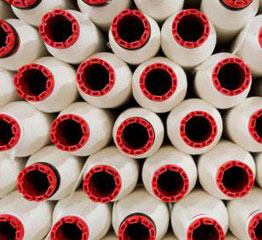Nylon, a versatile synthetic fiber, is widely utilized in webbing applications due to its exceptional properties.

Known for its toughness, strength, durability, and dyeability, nylon is an ideal material for webbing, straps, tapes, and belts. One of the unique characteristics of nylon is its ability to elongate under load, which allows it to absorb energy effectively. This makes it particularly useful in applications where energy absorption is crucial; for example, in safety harnesses and load-bearing straps.
Nylon fiber is hygroscopic, meaning it absorbs moisture from the environment. Unlike other fabrics that merely wick moisture away from the skin, nylon fiber gains moisture content. Despite its moisture absorption, nylon webbing remains a preferred choice in many applications due to its resilience and performance characteristics. So, it effectively balances functionality and durability.
Manufacturing process
The manufacturing process involves creating long-chain synthetic polyamides with recurring amide groups (-NH-CO-). This chemical structure imparts several advantageous properties to the webbing. For example, it boasts excellent strength and flexibility, which makes it capable of withstanding significant stress and strain without breaking. Furthermore, its toughness and elasticity ensure that nylon webbing can endure repeated stretching and bending. Because of this, it continues to maintain its shape and function over time.
Nylon fiber exhibits remarkable abrasion resistance, which is essential for webbing that experiences frequent friction and wear. This resistance to wear and tear extends the lifespan of the products, specifically making it a cost-effective choice for long-term use. Additionally, nylon webbing is washable and dries quickly; therefore, it adds to its convenience and practicality in various applications.
Nylon webbing’s moisture absorption does not detract from its other benefits. The webbing is resistant to insects and microbes, further enhancing its durability and suitability for outdoor and rugged environments.
Altogether, these properties make nylon an indispensable material in the production of webbing, ensuring reliability and performance in demanding applications.
To summarize, properties of nylon include:
- Excellent strength
- Flexibility
- Toughness
- Elasticity
- Abrasion resistance
- Washable
- Ease of drying
- Moisture absorption
- Insect & microbe resistant
Our nylon products include:
- Shoulder straps
- Harness webbing
- Chin straps
- Helmet suspension
- Binding tapes
- Lap belts
- Shock absorbing webbing






